Central Election Commission approves protocol on results of presidential election
On February 11, 2024, the next session of the Central Election Commission (CEC) was held under the chairmanship of Mr.Mazahir Panakhov. The session considered the issue of summing up the results of the early Presidential elections of the Republic of Azerbaijan, held on February 7, 2024 and submitting the CEC protocol on the results of the elections to the Constitutional Court along with the relevant documents.
The session attended by an authorized representative of political party, the candidate of which has been registered, a representative of the international observation mission, a member of the commission with the consultative right, an observer who received a special permit and representatives of the media, provided detailed information on the steps taken and the projects implemented to prepare and conduct the elections.
It was noted that for the first time in the conditions of full restoration of the sovereignty and territorial integrity of the country, the Presidential elections were organized at a high level in every region of the republic, including the regions liberated from occupation, thus turning into a historic event of exceptional significance in the socio-political life of our country due to the free, fair and transparent conduct of the elections. All the activities related to the Presidential elections were carried out consistently, systematically and in an organized manner in accordance with the Calendar Plan compiled and approved by CEC based on the requirements of the Election Code. Both the Commission and the relevant authorities focused on the precise fulfillment of duties and powers provided for by the electoral legislation. The processes of updating the voters’ list, awareness-raising of all electoral stakeholders, including voters, nomination and registration of presidential candidates, creating opportunities for election campaigning on the basis of equal conditions, ensuring free and unhindered conditions for the activities of observers and media representatives, proper observance of procedures related to the organization of voting on election day and other activities, which are important stages of the electoral process were carried out timely and effectively in a manner established by law.
It was reported that after the start of the elections, CEC carried out a large-scale campaign covering numerous projects in various fields and the education program was implemented in close cooperation with relevant structures in order to inform voters, educate election participants, further improve the knowledge, skills and professionalism of members of Constituency and Precinct Election Commissions.
It was stated that 17 applicants submitted relevant documents to the Central Election Commission for participation as candidates in the Presidential elections, and signature sheets were issued to them upon the verification of their candidacies. 10 out of the 17 contenders, whose candidacies were verified did not return their signature sheets, at all. The candidacies of all 7 applicants who returned the signature sheets and the documents attached were registered, 5 of which were nominated by political parties, and 2 participated in the elections on their own initiatives. The process of examination of the candidates' documents was carried out transparently for all the interested persons and was fully open to the public. Authorized representatives of presidential candidates and political parties, representatives of international observation missions and media representatives had the opportunity to monitor the processes directly and get familiarized with the documents at any time.
It was also noted that the registered candidates were provided with equal conditions, comprehensive and wide opportunities for freely communicating their election platforms to voters. By the decision of the Central Election Commission, 6 hours a week (3 hours on television, 3 hours on radio) free airtime, which is 2 times higher than stipulated by law, was allocated on the Public Broadcasting Company, along with free space for publication in the newspapers “Azerbaijan”, “Khalg Gazeti”, “Respublika” and “Bakinsky rabochiy.” For the purpose of paid campaigning, price offers from 44 media structures were submitted to the CEC, and this information was posted on the Commission's website to familiarize candidates, and the principle of equal conditions for all candidates was constantly respected. In accordance with the requirements of the Election Code, a total of 281 free venues - 139 outdoor and 142 indoor venues were allocated on 125 electoral constituencies to conduct meetings of registered candidates and political parties whose candidates were registered with voters at the preliminary stage in cities and districts of the country. Furthermore, in order to provide wider opportunities, about 4,500 additional venues were delivered to the disposal of the campaign subjects, covering mostly, the residential settlements of the country. Candidates and political parties, the candidate of which has been registered held meetings with their electorate in these places free of charge without the requirement of permit, by only informing the relevant Constituency Election Commission in advance. More than 10,000 oversized billboards covering all polling stations have also been installed for the campaign of candidates. The subjects of pre-election campaign used all these opportunities and equal conditions created by the CEC freely and independently. The pre-election campaign started from January 15, 2024 lasted up to 24 hours before the start of voting and generally, took place in conditions that met modern requirements.
It was also emphasized that in connection with the Presidential elections, an extensive public education campaign was conducted for almost all participants of the electoral process, as well as for voters. Thousands of various posters on the date of the elections, voting rules, as well as calling to elections or educational type were printed and posted in easily seen places within the territory of all residential settlements. A total of 8 video clips and audio produced by the CEC on the call to participate in the voting, informing voters of the voting day, search of the name in the voters’ list, voting based on the supplementary voter list, use of de-registration cards and voting procedures were regularly broadcasted on TV and radio channels, as well as on social media.
The session participants were informed that various projects had been implemented to ensure free and fair voting in elections for all voter groups, as well as for voters with visual, hearing and mobility disabilities. Visually impaired voters were able to exercise their constitutional rights without anyone’s assistance on Election Day, using a Braille-based stencils that displayed information on the ballot. To ensure the free movement of voters with limited mobility, in 2042 polling stations where the need for installing ramps had been defined, wide opportunities were created for this group of voters to come to the polling station independently. As part of the CEC voter education program, all videos were produced with subtitles, thus playing a significant role in awareness-raising of hearing-impaired voters.
It was also emphasized at the session that the elections were held in an atmosphere of openness and along with other means of ensuring a high level of transparency in the Presidential elections, therewith, webcams were mentioned that allow monitoring the voting process from beginning to end, uninterruptedly and directly via the internet at 1,000 polling stations covering the entire geography of the country. It was noted that webcams in these elections, meeting high technical parameters, provided a clearer visual effect through an updated surveillance system. The components of the monitoring system have been completely updated in terms of hardware and software, as well as the internet page for monitoring live the processes at polling stations on Election Day. Internet users had the opportunity to observe in real time all the processes taking place on the voting day at polling stations, without having to register through the access on the CEC website, both inside and outside the country.
It was also reported that 790 international observers representing 72 competent international organizations and 89 countries took part in the observation of the Presidential elections. At the same time, 217 representatives from 110 leading foreign media entities of the world observed the elections, after being provided with relevant badges by CEC. Representatives of local media functioning in the country had been participating in the election observation freely and without any obstacle, without the need for any additional accreditation since the start of the election competition.
More than 90,000 local observers representing numerous political parties, registered candidates, non-governmental organizations, civil society institutions and public associations, as well as those who participated in the elections on their own initiative, also took part in the election observation. It should be noted that the political parties have shown a particularly serious interest in these elections. More than 51,000 observers from 19 political parties, including 5 political parties whose presidential candidates were registered and candidates who participated in the elections on their own initiative, actively participated in ensuring the transparency of the elections. The high activity of non-governmental organizations was clearly manifested in the observation of the Presidential elections. In general, about 7,000 observers from 83 non-governmental organizations, civil society institutions and public associations actively joined the election observation. At the same time, the “exit poll” was conducted by 3 specialized organizations, 1 of which arranged its activities together with a foreign partner. The results of the "exit polls" almost coincided with the official results of the CEC.
Overall, during the election run-up, on Election Day and post-election periods, all opportunities have been created for both local and international observers and representatives of local and international media to carry out their activities freely and without any obstacle. Based on the observations conducted, the elections attended by thousands of observers were assessed by them as a free, fair and modern-day process.
Detailed information was also provided on the opportunities created to ensure the constitutional rights of citizens more effectively in the elections and it was noted that during the entire election campaign, CEC received only 1 complaint, in connection with which appropriate measures were promptly taken. On Election Day and in the following days, there were no complaints about any violations filed to CEC and lower-level election commissions. On the voting day, CEC responded immediately and promptly took the necessary steps regarding the inquiries of voters received at the Commission's electronic hotlines and hotline #115 regarding the addresses of polling stations, voter lists and other similar issues.
It was also noted at the session that the Presidential elections were held on 125 election constituencies at 6537 polling stations, 6319 of which were permanent, 218 were temporary. 47 of these polling stations were located in the territories liberated from occupation, 49 - in embassies, consulates, and diplomatic missions of Azerbaijan in 37 foreign countries. On the voting day, voters demonstrated high activity by coming to the polling stations, freely and independently expressing their will. 76.43 % of voters took part in the voting in the whole country. The data on voter turnout by means of special software was transmitted directly to the Central Election Commission through the State Automated Information System 5 times during the Election Day and posted on the Commission's website. Following the closure of the polling stations on the voting day, continuous counting of votes was carried out and preliminary protocol data of Precinct Election Commissions were promptly posted on the CEC website and within a few hours, based on received data from the absolute majority of polling stations, preliminary voting results were delivered to the public.
It was noted that the final protocols on the results of voting and other election documents were transferred from the Precinct Election Commissions to the Constituency Election Commissions and from there to CEC within the timeframe and in accordance with the procedure established by law. The protocols of Constituency Election Commissions on the voting results and the documents attached to them were fairly and comprehensively examined. Also on Election Day, information available through different sources, even on online platforms, was studied as widely and comprehensively as possible using various alternative resources, as well as images via the webcams installed at polling stations.
As a result of the investigations conducted, law violations were revealed that did not allow determining the will of the voters, namely in PEC №38 of Ganja-Samukh-Goranboy ConEC №41, in PECs №7 and №27 of Gusar ConEC №61, in PEC № 9 of Salyan-Bilasuvar-Neftchala ConEC №65, in PEC № 2 of Sabirabad-Shirvan ConEC № 68, in PECs №7 and №31 of Lankaran city ConEC №77, in PEC №6 of Goychay-Agdash ConEC №92, in PEC №2 of Barda ConEC №99, in PEC №1 of Sheki city ConEC №114 and in PEC №6 of Sheki rural №115. The Commission decided to invalidate the results of voting in these polling stations and to dismiss the Precinct Election Commissions of these polling stations.
The CEC protocol on the results of the Presidential elections was compiled at the session and the election results were summarized, signed, and approved by all the Commission members. In accordance with the requirements of the Election Code, it was decided to submit the CEC protocol, together with relevant documents to the Constitutional Court of the Republic of Azerbaijan for approval and publication of the election results.







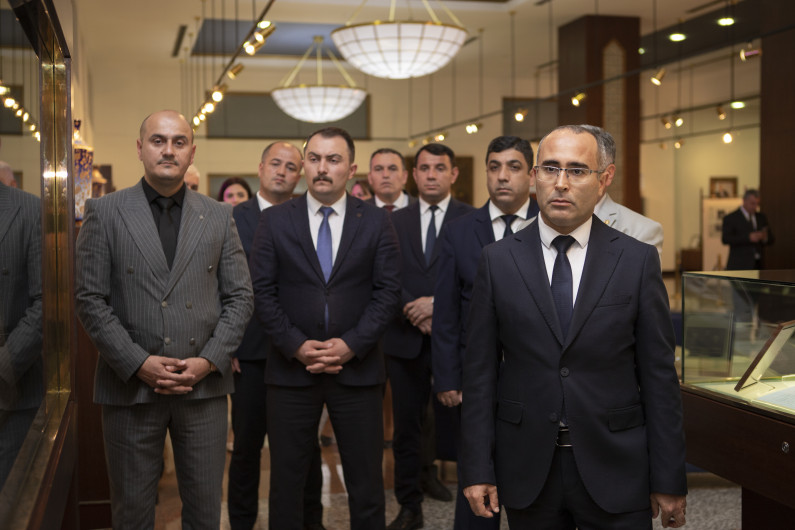
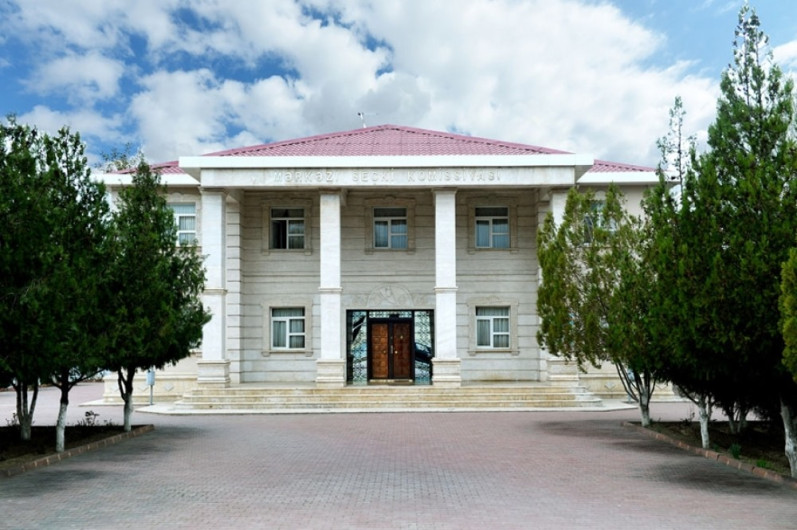

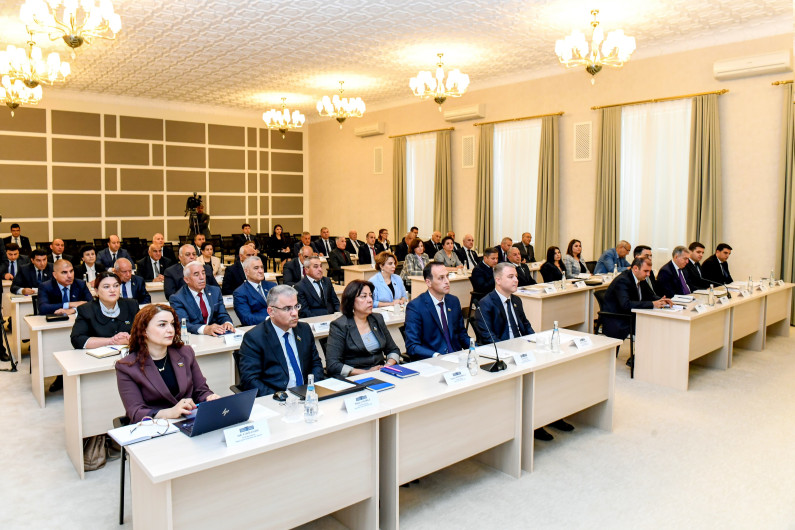
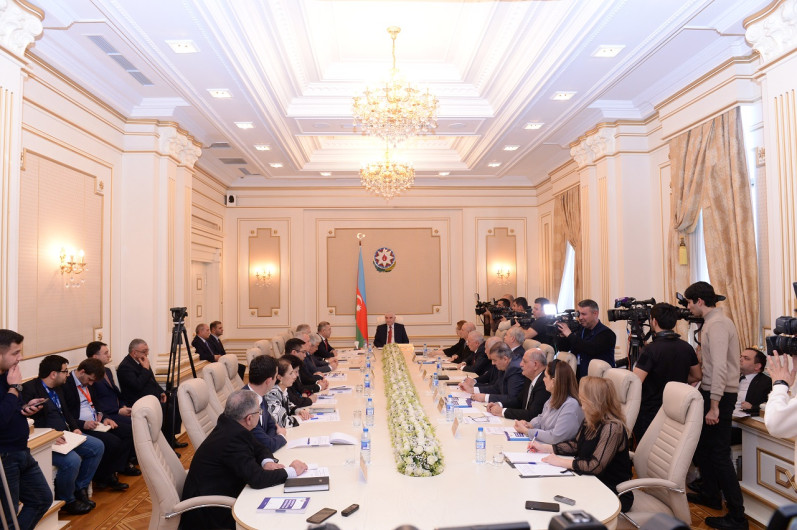
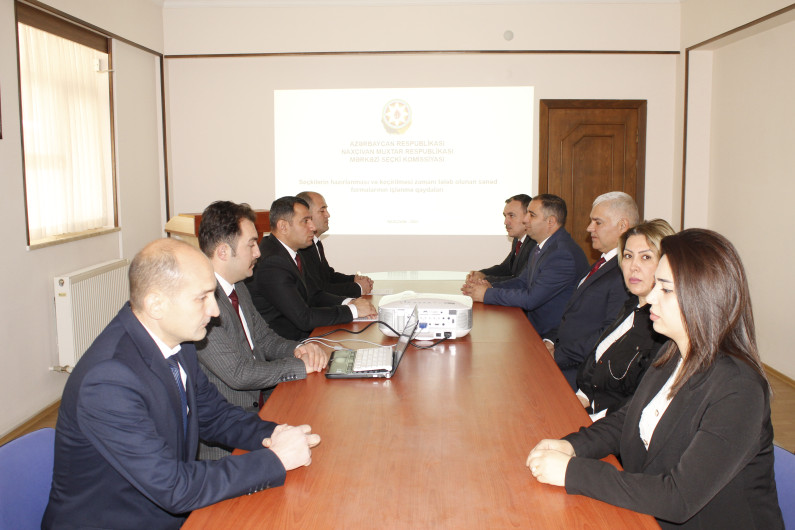

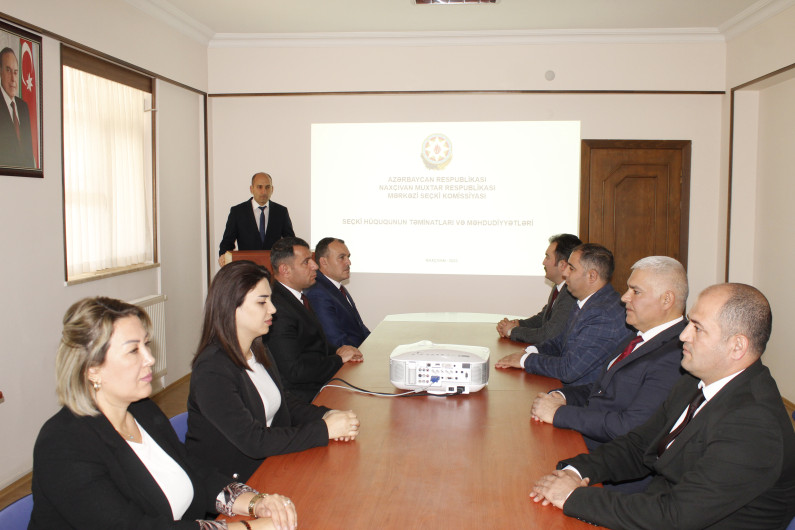
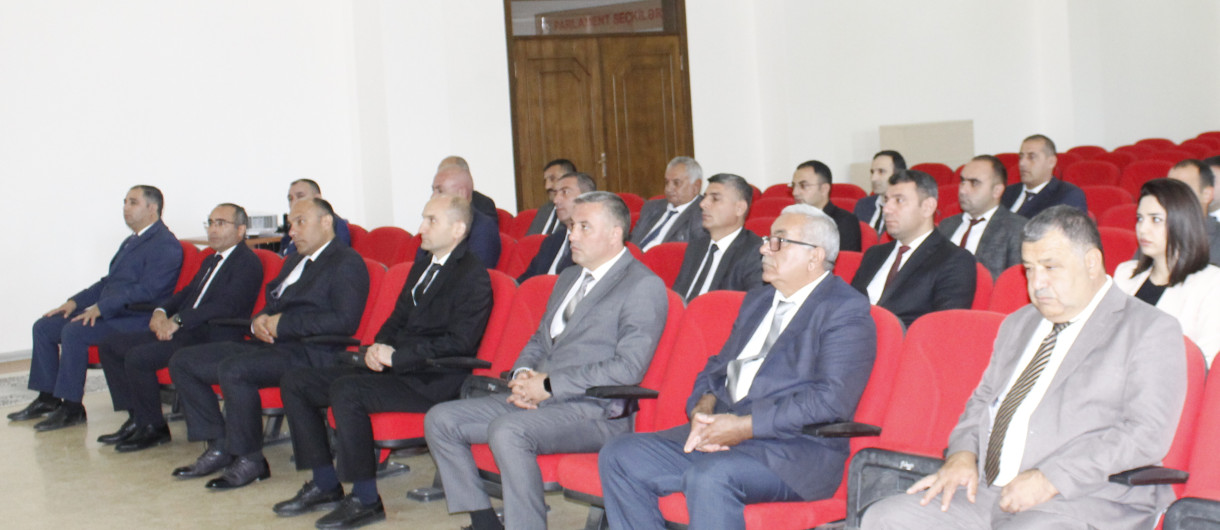
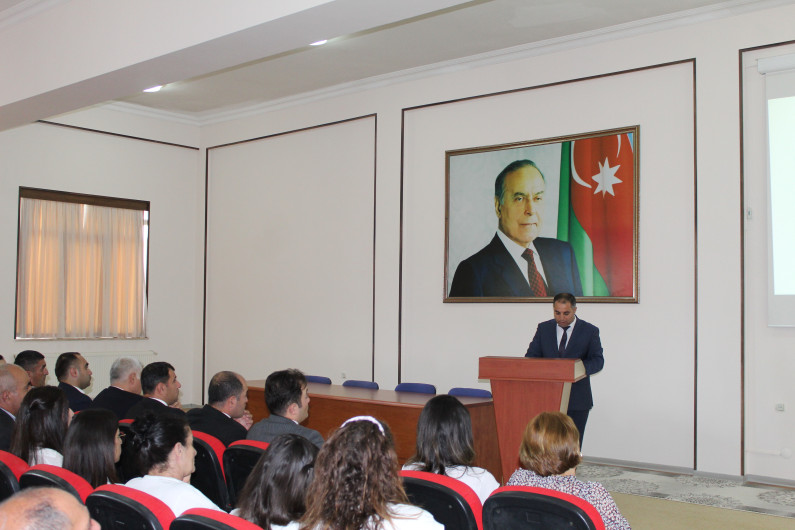
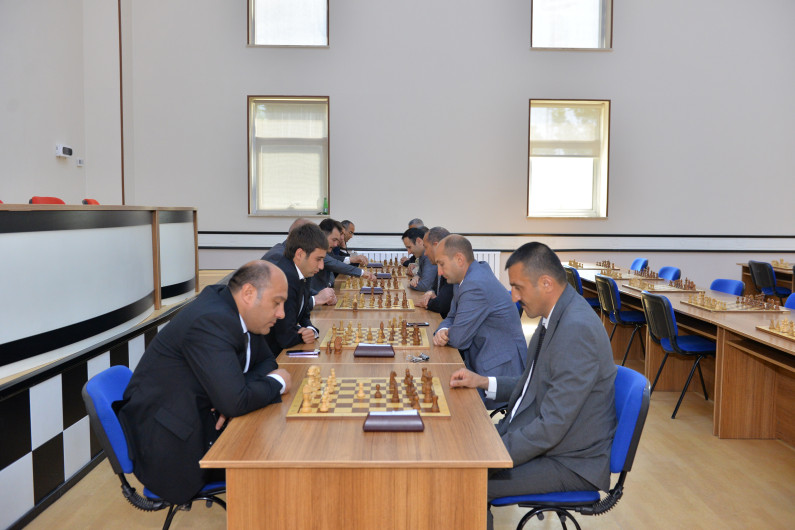
 Phone:
Phone:  Fax:
Fax: 